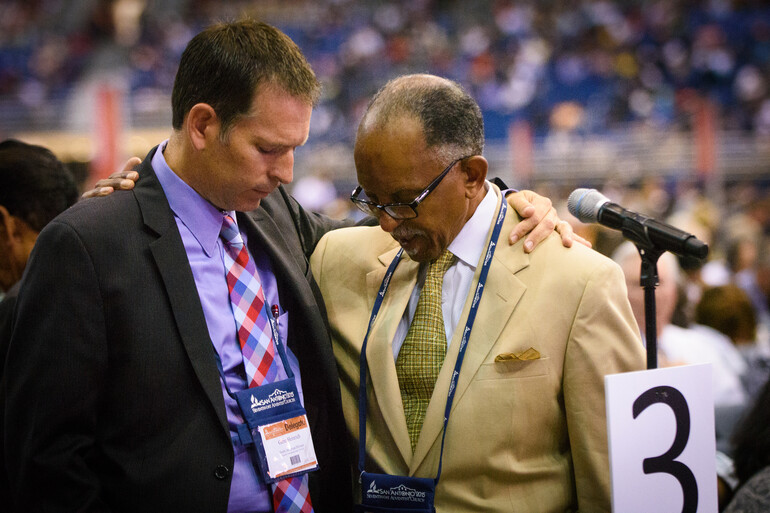Delegates to the 60th General Conference Session in San Antonio, Texas, in July elected a global leadership team, updated church policies and clarified doctrinal statements. In the minds of many, though, the main agenda item was ordination of women pastors — specifically, whether to empower the 13 divisions of the world field to determine what is best for their own territories. What if some divisions then ordained women and others didn’t — would that sacrifice global church unity?
First-century Christians faced a similar dilemma and also held a church council to resolve it. As recorded in Acts 15, the major issue at that Jerusalem session was circumcision. Were non-Jewish believers allowed to decide for themselves whether to perform that spiritual rite? And could the global church maintain unity without requiring uniformity among the various cultures of the world field?
In Jerusalem, the apostles decided yes. In San Antonio, delegates voted no.
The most striking difference between Jerusalem and San Antonio was the spirit of the discussion. Acts 15 records mutual respect among the apostles, despite their disagreements. San Antonio was different. Although General Conference leaders diligently devoted nearly an entire morning to spiritual preparation and clear explanations, some delegates persisted in partisan applause. They continually interrupted meaningful discussion with endless “points of order.”
Even more hurtful was the general mistrust of brothers and sisters with differing convictions. Character denigration began during the months leading up to the session. Some who favored a women’s ordination option denounced those who did not as being chauvinistic and out-of-touch with Western culture. One parody website mocked Doug Batchelor, a pastor and an outspoken opponent of women’s ordination. Portraying him disrespectfully was supposedly in good fun. But fun is when you are laughing with someone; it gets nasty when you laugh at them.
Nastier yet was the outright character assassination by one side against the other. Ty Gibson, for decades one of the Northwest’s most respected Adventist thought leaders, published a compelling article endorsing women’s ordination. Some who previously supported Ty immediately denounced him as a rebel against church leadership and a cultural compromiser.
During the July 8 discussion in San Antonio, delegates continually expressed fears and allegations of cultural compromise and rejection of the biblical order of authority. Biblical counsel should always be central to our spiritual DNA. But the Holy Scriptures speak as much to our attitudes and behavior as they do to our beliefs.
Therefore, the low point of the day for me was the shameful treatment of Jan Paulsen, retired General Conference president. Our current world president Ted Wilson, in a gracious gesture, invited his predecessor to share his convictions — knowing full well that Paulsen disagreed with him on this particular issue. Indeed, Paulsen politely yet passionately pleaded with delegates to follow the Acts 15 model — trusting each region’s leaders to know what is best for their own territory. Having been a missionary to Africa, he reminded those delegations that he had lived as one of them and understood their culture.
At that, several delegates audibly jeered their former leader and world president. More incredibly, they were not rebuked as delegate after delegate arose to complain that Jan Paulsen was allowed to speak two minutes longer than a normal delegate could.
The scene was disheartening — I’ve never seen a world church leader, active or retired, publicly treated with such disrespect. Paulsen, clearly grieved, left the meeting early. I witnessed the sad sight of him slipping out of the building shortly before the vote was taken.
There were many wonderful things too that occurred during the session. But often we learn best from instances that seem to be roadblocks or failures. Often they are the crucible for lessons learned, the catalyst for positive change.
Here are two of the top lessons I have considered in reflecting upon San Antonio.
1) God’s people show they are His by their love.
Being nice is Kindergarten 101, but biblical love, Christ-like love, goes far beyond nice. Jesus’ love was extended to all — not just those who agreed with Him. That’s a good lesson for me and those of us who seek to represent our Lord. How we act toward each other says volumes about who we follow. The apostle Paul said that religion is a sham without love in action. (See 1 Corinthians 13.)
2) Cultural sensitivity matters.
Our world church is becoming so culturally diverse that we ignore these differences at our peril. True love isn’t loud. It doesn’t demand its own way. It listens to understand another's heart. Each of us in our own corners of the world must listen, learn to respect the unique cultural challenges of the others and trust leaders there to apply the work of our church to unify us in mission within the culture of God's kingdom.
Self-righteous pontification should never be welcome among us. Jesus once told the stubborn people of Galilee that the citizens of Sodom would fare better in the judgment than they would.
Does His warning apply today as well?











